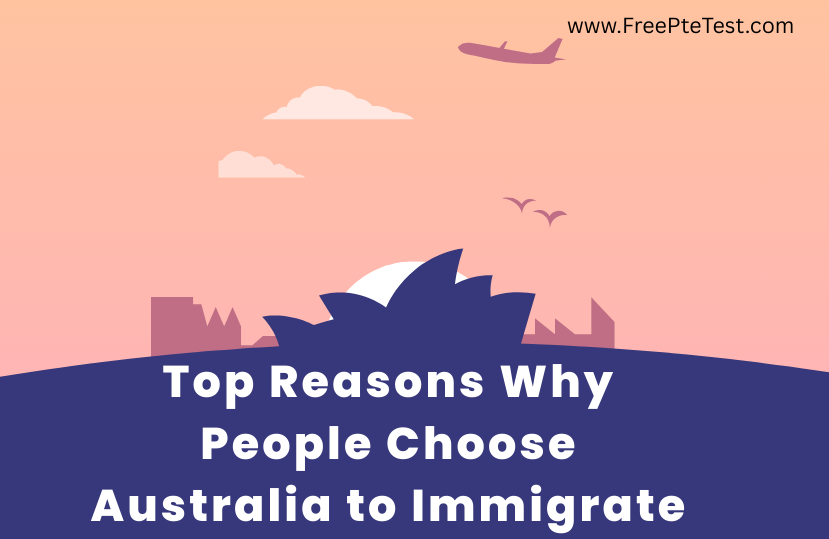Australia is a top destination for immigrants due to its strong economy, high quality of life, exceptional healthcare and education systems, and inclusive multicultural society. The country offers clear pathways to residency and citizenship, along with a safe and beautiful environment that promotes work-life balance. However, immigrants often face challenges such as employment barriers, language difficulties, racism, housing issues, social isolation, and mental health stress. These obstacles highlight the need for comprehensive support systems to ensure successful integration and well-being.
Here is a detailed explanation:
Australia consistently ranks among the most popular destinations for immigrants worldwide. The country’s appeal is driven by a combination of economic, social, and lifestyle factors that make it an attractive choice for individuals and families seeking a better future. Here are the Top Reasons Why People Choose to Immigrate to Australia:
Career Opportunities and a Strong Economy
- Australia’s robust and stable economy offers numerous career opportunities, especially for skilled workers. The country maintains low unemployment rates and equitable minimum wage standards, ensuring even entry-level positions provide a comfortable standard of living.
- The government actively seeks skilled migrants to fill critical shortages in various sectors, making it easier for professionals to find rewarding jobs and advance their careers.
High Quality of Life
- Australia is renowned for its high standard of living, with excellent infrastructure, affordable housing, and access to modern amenities.
- The country’s cities, such as Melbourne and Sydney, consistently rank among the world’s most liveable cities, offering residents a safe, clean, and vibrant environment.
Exceptional Healthcare System
- Permanent residents and citizens have access to Medicare, Australia’s public healthcare system, which provides free or subsidized medical treatment and medications.
- The healthcare system is recognized as one of the best globally, ensuring peace of mind for individuals and families.
World-Class Education
- Australia boasts a top-tier education system, with free or subsidized primary and secondary education and a range of highly ranked universities and vocational institutions.
- The country is a leading destination for international students, offering diverse academic programs and a vibrant learning environment.
Pathways to Permanent Residency and Citizenship
- Australia provides clear and attainable pathways to Australia Permanent Residency and Citizenship, including skilled migration, family reunion, and humanitarian visas.
- Permanent residents enjoy many of the same rights as citizens, including access to government services and the right to apply for citizenship.
Multicultural and Welcoming Society
- Australia is a multicultural nation, home to people from diverse backgrounds. Over 30% of the population is made up of immigrants, creating an inclusive and welcoming environment.
- The country values diversity, religious freedom, and free speech, making it easier for newcomers to integrate and feel at home.
Work-Life Balance and Relaxed Lifestyle
- Australians place a strong emphasis on work-life balance, with a laid-back lifestyle that prioritizes time with family and friends, outdoor activities, and recreation.
- The country’s natural beauty, pleasant climate, and outdoor culture contribute to a healthy and enjoyable way of life.
Safety and Security
- Australia has a low crime rate, providing a safe and secure environment for individuals and families to live, work, and study.
- The political system is stable, and the rule of law is upheld, further enhancing the sense of security.
Beautiful Natural Environment
- Australia is famous for its stunning landscapes, unique wildlife, and year-round pleasant weather, making it ideal for those who enjoy outdoor activities and nature.
Summary Table: Key Reasons to Immigrate to Australia
| Reason | Description |
| Career Opportunities | Thriving job market, high wages, and demand for skilled workers |
| Quality of Life | High standard of living, affordable housing, and modern infrastructure |
| Healthcare | Access to world-class, subsidized healthcare through Medicare |
| Education | Free/subsidized schooling, top-ranked universities, and diverse academic options |
| Pathways to Residency | Clear routes to permanent residency and citizenship |
| Multicultural Society | Inclusive, diverse, and welcoming environment |
| Work-Life Balance | Emphasis on leisure, family time, and outdoor activities |
| Safety | Low crime rates and stable political environment |
| Natural Beauty | Beautiful landscapes, unique wildlife, and favorable climate |
Australia’s combination of economic opportunity, quality of life, and inclusive society makes it a top choice for immigrants from around the world.
Main Challenges Faced by Immigrants in Australia
Immigrants in Australia encounter a range of challenges as they adapt to their new environment. These challenges can impact their ability to integrate, find stability, and thrive in Australian society.
Employment Barriers
- Many immigrants, especially those from non-English-speaking backgrounds, struggle to secure employment. Key issues include:
- Non-recognition of overseas qualifications
- Lack of local work experience
- Discrimination in hiring practices
- Limited access to specialist employment services
- Language barriers
- Even when employed, immigrants often experience income inequality compared to the broader population.
Language Barriers
- Limited English proficiency makes it difficult for immigrants to access services, secure jobs, and participate fully in society.
- Women and those with limited prior education face additional challenges in learning English due to domestic responsibilities or lack of educational background.
Racism and Discrimination
- Immigrants, particularly those from African, Muslim, or visibly different backgrounds, report experiencing racism and discrimination in various aspects of life, including employment, housing, and social interactions.
- Such experiences can lead to social isolation and impact mental health.
Housing and Accommodation
- Finding affordable and suitable housing is a significant challenge due to:
- High costs
- Lack of local references
- Discrimination by landlords or real estate agents
- Unfamiliarity with the Australian housing market and regulations.
- Many immigrants experience housing instability, with frequent moves and short-term leases.
Social Isolation and Lack of Networks
- Immigrants often lack established social and professional networks, making it harder to find jobs, housing, and community support.
- Forming new relationships outside their cultural group can be difficult due to language and cultural differences.
Mental Health and Wellbeing
- The stress of migration, separation from family, culture shock, and the pressure to succeed can lead to mental health issues such as anxiety, depression, and loneliness.
- Refugees and humanitarian entrants may also carry trauma from pre-migration experiences, including war, persecution, or violence.
Navigating Complex Systems
- Immigrants face difficulties understanding and accessing services related to healthcare, education, and legal rights due to language and system complexity.
- Some report challenges with the migration advice sector, including poor-quality advice, lack of updates, and financial exploitation by unscrupulous agents.
Educational Adjustment
- Children and adults may struggle to adapt to a new education system, especially if they have limited English or disrupted prior education.
- This can affect academic progress and future opportunities.
Visa and Legal Uncertainty
- Temporary visa holders may experience insecurity regarding their legal status, which can affect their ability to plan for the future and access certain services.
Summary Table: Key Challenges for Immigrants in Australia
| Challenge | Description |
| Employment | Difficulty finding jobs, non-recognition of qualifications, discrimination, income inequality |
| Language | Limited English proficiency, barriers to services and integration |
| Racism & Discrimination | Prejudice in employment, housing, and society |
| Housing | High costs, lack of references, discrimination, instability |
| Social Isolation | Lack of networks, difficulty forming new relationships |
| Mental Health | Stress, trauma, loneliness, culture shock |
| Navigating Systems | Complex healthcare, legal, and migration processes |
| Education | Adapting to new systems, language barriers, disrupted schooling |
| Visa Uncertainty | Insecurity for temporary visa holders, limited access to services |
These challenges highlight the need for targeted support and inclusive policies to help immigrants successfully settle and contribute to Australian society.
Summary:
- Australia attracts immigrants with strong job opportunities, quality healthcare, and education.
- Cities like Sydney and Melbourne offer a high standard of living and vibrant culture.
- Clear residency and citizenship pathways make long-term settlement attainable.
- Immigrants face challenges like job discrimination, language barriers, and housing struggles.
- Targeted support is essential for successful immigrant integration and mental well-being.
FAQS:
Q1. Why is Australia a popular destination for immigrants?
Australia offers strong economic opportunities, a high quality of life, excellent healthcare, and a welcoming multicultural environment.
Q2. What career opportunities exist for skilled migrants in Australia?
Skilled migrants are in demand across various sectors due to labor shortages, supported by low unemployment and fair wages.
Q3. Is healthcare accessible for immigrants in Australia?
Yes, permanent residents and citizens can access Medicare, which provides free or subsidized healthcare services.
Q4. What education options are available for immigrant families?
Immigrant children can access free or subsidized primary and secondary education, and Australia is home to many top-ranked universities.
Q5. What challenges do immigrants face in the Australian job market?
Immigrants often encounter issues like non-recognition of overseas qualifications, lack of local experience, and discrimination.
Q6. Do immigrants in Australia face language barriers?
Yes, limited English proficiency can hinder access to jobs, services, and social integration, particularly for older immigrants or women.
Q7. Is racism a concern for immigrants in Australia?
Unfortunately, some immigrants report experiencing racism and discrimination, especially in employment and housing sectors.
Q8. How difficult is it to find housing as a new immigrant?
High costs, lack of references, and discrimination can make finding suitable housing a challenge for new arrivals.
Q9. Are there mental health risks associated with immigration to Australia?
Yes, immigrants may experience stress, anxiety, and isolation due to cultural adjustment, separation from family, and settlement pressure.
Q10. What support exists for immigrants facing settlement challenges?
While some services exist, more targeted support is needed to help immigrants navigate systems, find employment, and integrate socially.




